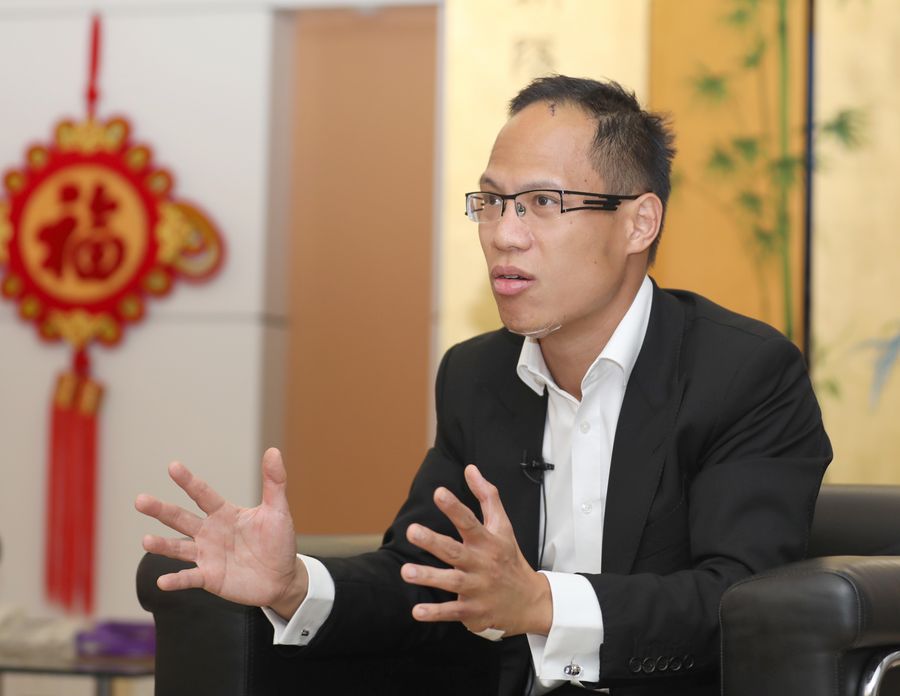Chan Tze-chin, a Hong Kong lawyer, has never thought he would become a victim of "mob lynching" simply for speaking up against violence and vandalism during a violent protest.
"Freedom should be exercised within the boundary of law, but the black-clad rioters are depriving others of their rights and freedom," he said.
HONG KONG, May 29 (Xinhua) -- Since the social unrest in Hong Kong started in June 2019, Hong Kong lawyer Chan Tze-chin has heard from the news about numerous cases of "mob lynching" of people who hold different views with the rioters, but has never thought he would become a victim.
Dressed casually and with only a bottle of water in hand, Chan was walking to a sports club for his weekly golf class on May 24 when he saw a group of black-clad men smashing the window panes of a clothes shop in Causeway Bay.
The busy shopping area was swarming with radicals on that day, who were protesting against a draft decision at China's top legislature on establishing and improving the legal system and enforcement mechanisms for the Hong Kong Special Administrative Region (HKSAR) to safeguard national security at the state level.
Out of indignation at the violence and vandalism, Chan blurted out: "Stay there. The police will arrest you."
He never expected these words would incite such a savage level of violence against him.

Chan Tze-chin talks to Xinhua during an interview in Hong Kong, south China, May 28, 2020. (Xinhua/Wu Xiaochu)
"They (rioters) knocked me to the ground, punched and kicked me and battered and stabbed me with umbrellas," he recounted.
Chan, dazed and covered in blood, tried to run away, but was quickly intercepted, surrounded and viciously beaten up again.
While he was being attacked, several masked men opened umbrellas to cover up the gruesome assault from view.
"At one moment, I felt I was going to die," he said. "I thought of my family. I was so scared."
When he finally got rid of the attackers, Chan found his T-shirt was torn, his head, face, clothes and shoes were drenched in blood. What's worse, his necklace and wedding ring were gone.
Chan was hospitalized for three days. The atrocity resulted in him needing multiple stitches on his head, neck, chin, hand and leg. "The wound on my neck behind the right ear was close to the artery. It could have been life-threatening if it had been deeper," he said.

Chan Tze-chin shows his wounds during an interview with Xinhua in Hong Kong, south China, May 28, 2020. (Xinhua/Wu Xiaochu)
In addition to the physical scars, the psychological trauma has also been punishing for Chan.
The video footage of Chan being chased and attacked went viral on the Internet, but Chan said he dared not watch it. "I feel scared when I see footage of the black-clad rioters," he said.
When he was still in hospital, Chan began to worry about the safety of his family as he learned that he had become a target of doxxing.
"I changed the privacy settings of my social media account while lying in the hospital bed to avoid further doxxing and online bullying."
There are also smear and sneer campaigns by some local media claiming that Chan feigned his ordeal for fame and money. Furiously refuting these rumors, Chan said: "I have a job as a lawyer and I have a family. Why would I risk my life like that?"
Having practiced law in Hong Kong for nearly 20 years, Chan said he was saddened by the recent significant decline in the law-abiding awareness of Hong Kong residents, especially those young people who break the law under the pretext of so-called "fighting for freedom."
"Freedom should be exercised within the boundary of law, but the black-clad rioters are depriving others of their rights and freedom," he said.
Chan said he noticed the attackers against him were mostly youngsters. "They are committing violent crimes in the streets as if they are playing video games," Chan said. "They have been brainwashed by biased teachers, twisted media reports, and some legal professionals who have condoned or even glorified violence."
According to figures from the Hong Kong police, among the 8,001 people who had been arrested from June 2019 to mid-April this year for their involvement in the unrest, 3,286, or about 41 percent, were students.
The suspect who slashed a police officer in the neck with a knife in October last year was a high school student. A 16-year-old, meanwhile, was arrested on May 24 for brutally assaulting a young woman when she was trying to clear the road barricades set up by the rioters.
Chan, born in Britain and raised in Hong Kong, said he sincerely hopes the chaos will end soon and order and normal life will be restored.

A resident signs in a street campaign in support of national security legislation for Hong Kong Special Administrative Region (HKSAR) in Hong Kong, south China, May 23, 2020. (Xinhua/Wu Xiaochu)
Over the past year, violence by rioters has escalated in Hong Kong. Vandalism, arson and assault have been rampant during the violent protests. At the same time, opposition forces and organizations advocating "Hong Kong independence" and "self-determination" begged for interference in Hong Kong affairs by external forces and even sanctions against Hong Kong.
Hong Kong's credit rating was downgraded by a global rating agency over the prolonged unrest and Hong Kong's GDP posted the first negative growth in 10 years.
An unstable Hong Kong cannot play the role of an international financial hub, Chan said.
Commenting on the decision adopted by China's National People's Congress to introduce Hong Kong national security laws, Chan said every country has national security legislation and that is the basic practice to protect the people.
"I am a nobody but was made a celebrity for being beaten up," he said, in self-mockery. "But I must speak out the truth."
(Video Reporters: Qiu Bo, Chu Xiong; Video Editor: Li Ziwei) ■



